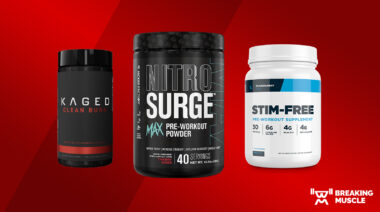Many supplement products that are commercially released make claims about the results you will achieve, but few are actually tested for efficacy. Often when they are tested the results show that they aren’t effective. Weight loss supplements are a shining example of this, as many tout various benefits to burning fat, losing weight, and even gaining muscle, but you never know what they actually do, and the ones that we all agree do work probably aren’t all that healthy.
If you’ve ever purchased supplements from a company called Prograde Nutrition, you’re probably familiar with their hokey marketing gimmicks and big sounding claims. This isn’t unique to this company, but it doesn’t serve the supplement community well, having been overrun with lofty sounding but false claims for many years.
A recent page on the Prograde website appeared that exemplified this obnoxious advertising method. The page is very colorful with huge lettering that claims “one of the largest, most complete weight loss clinical studies” had been performed on their supplement and that it was universally effective. They included some stats to back it up. When I see this sort of thing, I usually just shake my head and move on. Something must be wrong if you need to try that hard to catch my attention.
This time I decided to take a deeper look. Prograde wasn’t lying. There was indeed a study posted recently in the Journal of the International Society of Sports Nutrition regarding a Prograde product containing some stimulatory ingredients like caffeine and capsaicin, as well as some other natural additives like ginger.
But the claims on the website seemed extreme and this is because of how they are presented. For example is their claim that the supplement boasted 4.2 times the weight loss over a placebo. While true, the weight loss amounted to about 2% versus 0.5% respectively. Prograde is being truthful, but using the most shocking way to put it on paper. Any other company would do this to, but it’s something for us consumer to keep this in mind when reading claims. Another example is the “one of the largest” claim in regards to the study size. This study had seventy participants. Not bad, and might have been one of the largest, but far from huge.
Not only all that, and this took a small amount of digging, but the two head researchers on this project were paid by the parent company of Prograde. Uh-oh.
When asking if this is a sham, the answer is, it’s tough to be sure. If so, they did their best to cover it up and make it look nice, I’ll give them that. Prograde paid these researchers, but it might not be pure shadiness. An underhanded company would have pulled some smoke and mirrors to make a buck, sure, but if you had a socially responsible company and you wanted to put your money where your mouth was, it would be admirable to back up your claims with funded research.
Ultimately this type of study points to something that occurs more often than you’d think – companies providing their own research to boost their marketing. While it’s generally pretty iffy, this one seems about as legit as it can be. That said, with its lofty price tag, you’re still better off getting the ingredients elsewhere.
References:
1. Hector L Lopez, et. al., “Eight weeks of supplementation with a multi-ingredient weight loss product enhances body composition, reduces hip and waist girth, and increases energy levels in overweight men and women,” Journal of the International Society of Sports Nutrition 2013, 10:22
Photo courtesy of Prograde Nutrition.






